ONE MORE TIME (Jerry Lewis, 1970)
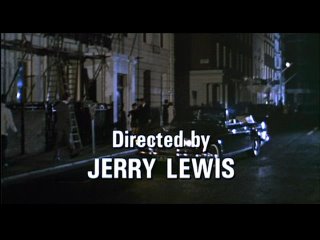 In 1968, Las Vegas Rat Packers Sammy Davis, Jr. and Peter Lawford teamed up for SALT AND PEPPER, the first of two British produced action/comedies that have largely been forgotten today, save for an unadvertised DVD release from MGM last year that packaged them up at a reasonable price.
In 1968, Las Vegas Rat Packers Sammy Davis, Jr. and Peter Lawford teamed up for SALT AND PEPPER, the first of two British produced action/comedies that have largely been forgotten today, save for an unadvertised DVD release from MGM last year that packaged them up at a reasonable price.SALT AND PEPPER - directed by Richard Donner, who got the job after establishing rapport with the two lead actors on an episode of “The Wild, Wild West” - is a largely unremarkable mélange that mixes late 60s secret agent hi-jinks with bits of clowning that could have easily been lifted from one of the duo’s Las Vegas nightclub routines. I haven’t seen the Dean Martin – Matt Helm films in quite awhile, but I think that they make for an apt comparison as they make for light, nostalgic wink-wink fun, but are hardly of any real importance.
The story, briefly: two nightclub owners (contrary to what one would expect given the seemingly racial pun of the title, Davis Jr. is Charlie Salt, while Lawford essays the role of Chris Pepper) happen upon a dead female undercover agent in Charlie’s dressing room, and thus find themselves embroiled in a plot to catch some radicals who plan to overthrow the current British regime with some harsh violent acts. A bumbling inspector (Michael Bates) wrongly becomes suspicious of Salt and Pepper, and winds up bugging their offices in order to gather information; of course, the inspector then becomes the butt-end of many of their jokes, which includes Davis Jr. breaking out his impressions of James Cagney and Humphrey Bogart in order to falsely convince the inspector that Salt has placed a bomb in the police precinct.
Most of the humor is ill-conceived, with Sammy’s played-for-laughs discovery of a dead female agent coming off most egregiously - he rummages through his closet for an item of clothing, dashes out of his room to perform a song, and only then realizes that he’s seen a body. There’s a brief, unremarkable musical interlude halfway through, but even those would improve with the sequel.
Which leads me to 1970’s ONE MORE TIME, scripted by the same writer, Michael Pertwee (Ulmer’s THE CAVERN; TV’s “The Persuaders”), but directed by Jerry Lewis, in the one film he's directed but didn't act in (if you don’t count a late voice cameo that emanates from the actor below).
 The story opens at the familiar Salt & Pepper nightclub in Soho London from the first film, but smartly moves away from that location in the first half hour once a mystery is put into gear. After finding out that they owe mass sums of money, Chris Pepper (Lawford) decides to ask Lord Sydney Pepper, his twin brother (also played by Lawford), for the cash. Unfortunately, the two don’t get along so well, and he says no. Undaunted, Chris decides to put on his brother’s style of clothing in order to get a free meal, but that fake mustache and dress rehearsal of the phony British accent comes in handy once it’s revealed that his twin has been murdered. Unbeknownst to Charles, Chris assumes the role of his dead brother in order to forgo his money woes, letting Charles believe that his best friend has been killed. Chris, now in disguise as Lord Sydney, hires Charles for his assistant and takes him to live in a well-appointed castle in the country. Charles takes the “Uncle Tom” position (as he puts it to one of the grievers at the funeral for Chris) to solve his faithful friend’s murder.
The story opens at the familiar Salt & Pepper nightclub in Soho London from the first film, but smartly moves away from that location in the first half hour once a mystery is put into gear. After finding out that they owe mass sums of money, Chris Pepper (Lawford) decides to ask Lord Sydney Pepper, his twin brother (also played by Lawford), for the cash. Unfortunately, the two don’t get along so well, and he says no. Undaunted, Chris decides to put on his brother’s style of clothing in order to get a free meal, but that fake mustache and dress rehearsal of the phony British accent comes in handy once it’s revealed that his twin has been murdered. Unbeknownst to Charles, Chris assumes the role of his dead brother in order to forgo his money woes, letting Charles believe that his best friend has been killed. Chris, now in disguise as Lord Sydney, hires Charles for his assistant and takes him to live in a well-appointed castle in the country. Charles takes the “Uncle Tom” position (as he puts it to one of the grievers at the funeral for Chris) to solve his faithful friend’s murder.
All of this leads to a few fundamental questions: why would Chris keep his identity a secret for so long, especially once they’re out of harm’s way and out in the country? His friend is dealing with intense suffering following this loss, and it seems a stretch that Chris would take so long in doling out the info. And wouldn’t Chris be just a little bit more wary of the as-yet uncaught murderers, who’ll now think that their attempted slaughter wasn’t successful? He seems awfully brazen in announcing to the world that Lord Sydney is not dead. Admittedly, the answer of both of these questions would extinguish the ambers of pathos of this thought-to-be terminated friendship. Instead, Lewis decides to meditate on this theme of a lost friendship, which can’t help but conjure up the not-too-distant memories of Martin & Lewis and the fall-out of that break-up. There’s a distinct gravity to the scenes featuring Davis Jr. (including a touching musical performance) following the supposed death of Chris that would sorely be missed had Lewis kowtowed to plausibility.
As some esteemed critics have noticed, Sammy Davis Jr. is essentially playing Jerry, while Lawford does his best Dean Martin. Since Martin & Lewis broke up before Lewis began directing, this is the closet approximation we have of what it would have been like had Lewis made an M&L film. Not surprisingly, considering Lewis would be more comfortable with someone’s take on his comic personality than trying to fathom what made his slick former partner tick, Lawford takes a backseat once the film gets to the castle. Sammy seems to have been an apt pupil, because his handling of such prime Lewis shtick as the herky-jerky reactions to the monolithic door of his castle quarters (edited perfectly to “Thus Spoke Zarathustra” in a 2001: A SPACE ODYSSEY reference) and his facial distortions in response to the uncovering of the true identity (he overhears Chris cooing a recognizable come-on to one of his many female conquests) are mightily impressive.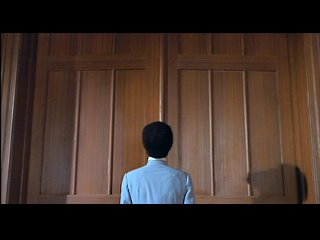


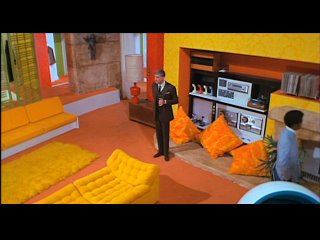 Shots of eye-popping color and rich, intricate décor that help to illustrate, without a doubt, Jerry at the top of his game.
Shots of eye-popping color and rich, intricate décor that help to illustrate, without a doubt, Jerry at the top of his game.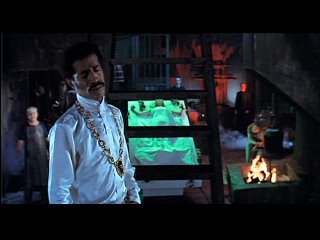
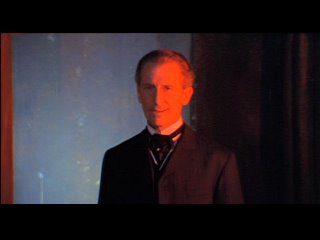
 Adding to the cult cache are cameos by none other than Peter Cushing and Christopher Lee, who appear as their Hammer Film counterparts (Dr. Frankenstein and Dracula, respectively) in the castle’s basement dungeon after Charles nervously stumbles upon a secret passageway located in a bookshelf.
Adding to the cult cache are cameos by none other than Peter Cushing and Christopher Lee, who appear as their Hammer Film counterparts (Dr. Frankenstein and Dracula, respectively) in the castle’s basement dungeon after Charles nervously stumbles upon a secret passageway located in a bookshelf.
After reconciling, Salt & Pepper fight it out with the murderers, but prove to be unsuccessful, as Lewis gives us a true meta-ending that sees our heroes addressing their real life names before being chased off the screen in long shot by the criminals. Instead of a simple The End, our final on-screen title is simply: That’s It!
Why isn’t this film better known in respect to the Lewis canon? Or, if it is, where may one read more about it?
Labels: Jerry Lewis

